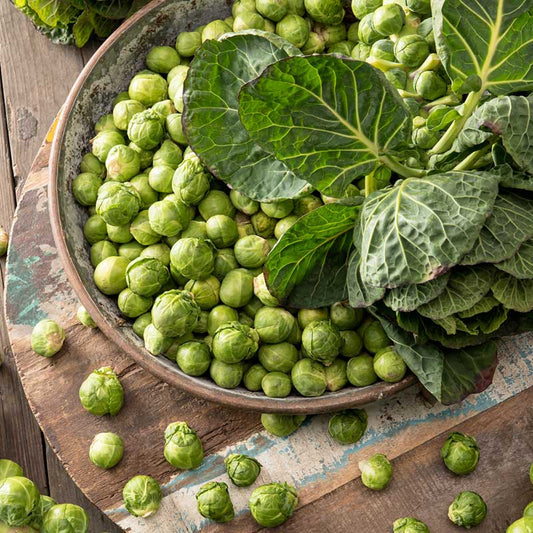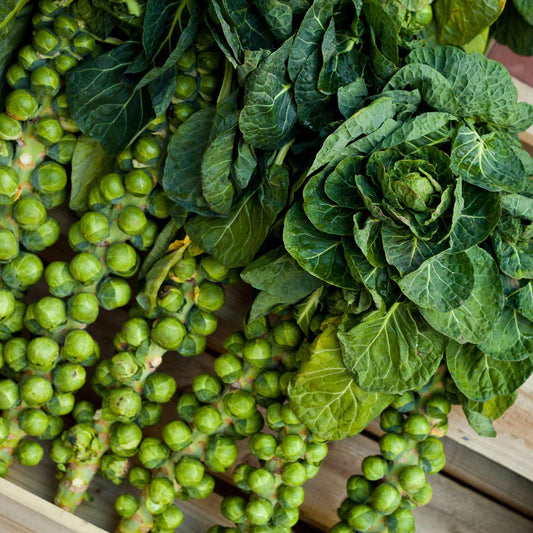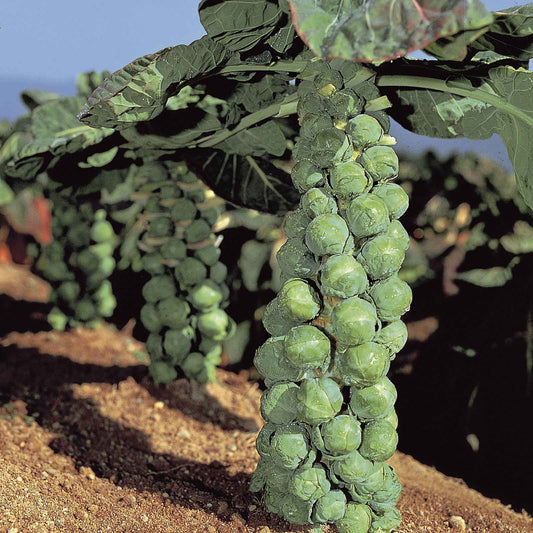-
main-collection-product-grid

Brussels Sprouts Seeds - Long Island Improved
Flavorful, heavy producer, great for freezing and very dependableBrussels Sprouts Seeds - Long Island Improved
Flavorful, heavy producer, great for freezing and very dependableRegular price As Low As $4.99Regular priceUnit price per -
main-collection-product-grid

Brussels Sprouts Seeds - Catskill
Large sprouts with excellent flavorBrussels Sprouts Seeds - Catskill
Large sprouts with excellent flavorRegular price As Low As $4.99Regular priceUnit price per -
main-collection-product-grid

Brussels Sprouts Seeds - Jade Cross
Vigorous, extra-early variety produces sprouts with excellent flavorBrussels Sprouts Seeds - Jade Cross
Vigorous, extra-early variety produces sprouts with excellent flavorRegular price $5.99Regular priceUnit price per
What we love about planting brussels sprouts
- Prefers full sun exposure
- Offers a rich, buttery taste similar to cabbage
- Recognized for their nutritional benefits and antioxidants
- Especially delicious roasted and grilled
choose homegrown brussels sprouts
It is worth noting that store bought Brussels sprouts are often picked too early, as shown in their bitter flavor and tough texture. End the cycle of dinnertime deadlock and grow your own! Picked fresh from your garden, they are tender and sweeter, offering an entirely different dining experience. These baby cabbage-like vegetables were named after Brussels, Belgium, where it is believed they were first widely cultivated in the 16th century.
how and when to start brussels sprout seeds
Brussels sprouts are a traditional winter-stock vegetable grown for their edible buds. These seeds perform best when started indoors about six weeks before the last spring frost and then transplanted into raised beds with a temperature of 45 to 75°F and either full sun or at least six hours of direct sunlight per day. When sowing your Brussels sprouts seeds, cover them with about 1/4 inch of soil. When seedlings reach four to six inches tall and/or sprout two to four leaves, transplant them into your outdoor garden with approximately 15 to 18 inches of space in between plants. The soil should be kept evenly moist by watering at the base of the plant. Brussels sprouts require about one inch of water per week. If growing in a warmer season or warmer zone, be sure to mulch around your plants to keep the soil cool. You can harvest Brussels sprouts when they are about a half to one inch in diameter, or after 90 to 180 days after planting. It is best to harvest the sprouts from the bottom of the stalks first if not cutting the entire stalk. After harvesting, store your Brussels sprouts in the freezer for three to five weeks or in the refrigerator for about one to two weeks.
the benefits of brussels sprouts
Packed with vitamin C, antioxidants, and cancer-fighting glucosinolates, Brussels sprouts are among the most powerful cold-weather superfoods. Eating Brussels sprouts can help with a multitude of health issues such as high blood pressure, high cholesterol, heart disease, and diabetes. Additionally, Brussels sprouts are said to reduce inflammation, improve gut health, and support eye health. To take advantage of the many health benefits offered by Brussels sprouts, grow and harvest your own! Brussels sprouts are most commonly roasted, sautéed, grilled, baked, or pan fried.
For more information about planting, growing, and caring for Brussels sprouts seeds, see the Brussels Sprouts Seeds Planting Guide.


